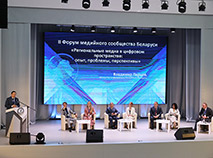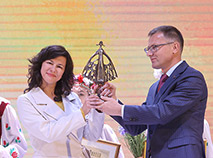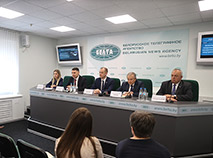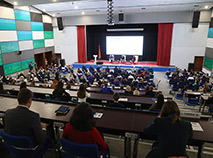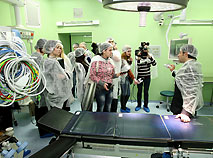Mass media in Belarus
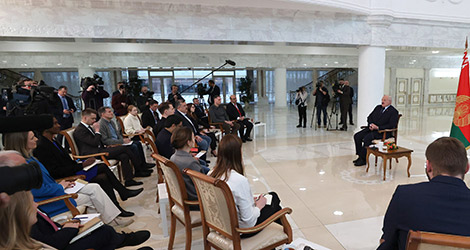
Belarusian President Aleksandr Lukashenko answers questions from foreign and Belarusian journalists, February 2023
A variety of print media and electronic media of different forms of ownership is operating in Belarus. Foreign media are widely represented in the national media space, too.
The largest national media outlets are the Belarusian Television and Radio Company (Belteleradiocompany), the Second National TV Channel, Stolichnoye Televideniye, the Belarus Segodnya publishing house, the Zvyazda publishing house, the BelTA News Agency.
Print mass media in Belarus
As of 1 January 2026, 862 print media outlets were published in Belarus, including 354 newspapers and 496 magazines, as well as 12 bulletins. More than half of them are private.
Printed press is available mainly in the Belarusian and Russian languages; there are publications in English and Chinese.
The most influential newspapers include Belarus Segodnya and the Respublika. Local editions of major Russian newspapers Komsomolskaya Pravda and Argumenty i Fakty are very popular in Belarus, too.
All in all, more than 1,700 foreign print media outlets are distributed in the country, including those from Russia and Kazakhstan.
As of 1 January 2026, there were 84 online media outlets, including 8 private ones, in Belarus.
News Agencies of Belarus
Six national news agencies, including four private ones, operate in Belarus.
The BelTA News Agency is the country’s biggest news agency, having the correspondent network in all the regions of the country.
Besides Belarusian news agencies, foreign media outlets have their offices in Minsk, including TASS, Rossiya Segodnya and Xinhua.
E-media in Belarus
As of 1 January 2026, there were 57 radio broadcast stations and 82 television broadcast stations in Belarus. 23 radio stations and 41 TV broadcast stations were private.
The majority of public radio stations is run by the local authorities.
There are around 30 FM radio stations in Belarus, including Radius FM, Radio Unistar (Belarusian-German media project), Europe plus and others.
The target audience of the Belarus radio station are foreigners interested in local events. The radio station airs programs not only in Belarusian and Russian, but also in English, German, Polish, French, Spanish and Chinese.
There are national TV broadcasters in Belarus: Belarus 1, Belarus 2 (youth audience), Belarus 3 (social and cultural content), Belarus 5 (sport), Second National TV Channel (ONT), Stolichnoye Televideniye (STV).
A new regional TV channel Belarus 4 was launched in September 2015. The channel provides a platform for all the oblasts of the country. In each oblast the channel offers an original TV product with a different label for each region: Belarus 4. Mogilev, Belarus 4. Gomel and so on...
The first and only Belarus’ international satellite TV channel, Belarus 24, went on air in 2005 (Belarus TV). Today it broadcasts 24/7 for over 200,000,000 viewers in more than 100 countries. The main TV content is news and analytics on major events in the country and the world, interesting TV projects, high-quality films, and, of course, a lot of programs on Belarus: the unique history and culture of the country, the main attractions and tourist destinations, Belarusian cuisine, famous brands, outstanding people.
The programs of the channel are transmitted via ABS-2A, Express AM8 and Azerspace-1 satellites. The channel is available to viewers in Europe, Middle East, Central Asia, Africa and North America. The programs are aired 24/7 in the Russian and Belarusian languages. The channel also provides online broadcasting on the Internet.
Around 200 international channels are broadcasted via cable TV in Belarus.
By June 2015 Belarus completed the switch from analog to digital broadcast television. Today digital broadcasting (the first multiplex of 8 TV and 1 radio channels) is available practically to 100% of the population.
Mass Media Legislation in Belarus
The Constitution of the Republic of Belarus and the Law "On Mass Media" (adopted in 2008 and amended in 2013, 2014, 2016, 2018, 2021, 2022, 2023) constitutes the legal basis of the media activity in Belarus.
The Constitution of the Republic of Belarus guarantees the freedom of thought, belief and expression, prohibits the monopolization of the media and censorship.
The Law "On Mass Media" formalizes the basic principles of mass media’s activity: accuracy, equality, respect for human rights and freedoms, diversity of views; protection of morals; observance of the norms of journalist’s professional ethics.
The law is the basis for introducing the elements of self-regulation in the media field in Belarus. To this end, the Public Coordination Council on the Media was set up. It consists of representatives of mass media, journalism organizations and experts.
Media and publishing forums in Belarus
-
International expo Mass Media in Belarus
-
Belarusian international media forum Partnership for the Future
-
Forum of young journalists
-
Minsk International Book Fair
The Belarusian Written Language Day, an annual celebration of the Belarusian culture, language, and literature, occupies a special place in the calendar of public events in Belarus.
Journalism contests in Belarus
-
National contest for print media Zolotaya Litera
-
National writing contest Zolotoye Pero
-
National television contest Televershina
Contests for media outlets and professional journalists are held in every region of Belarus.


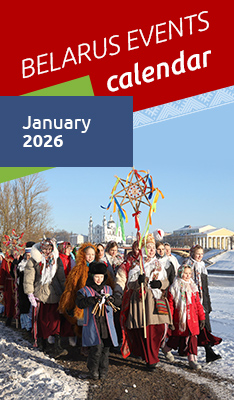




 print version
print version make home page
make home page add to bookmarks
add to bookmarks